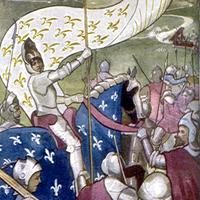38. The West Indies
"The city deck'd herself To meet me, roar'd my name: the king, the queen Bade me be seated, speak and tell them all The story of my voyage, . And when I ceas'd to speak, the king, the queen Sank from their thrones and melted into tears, And knelt and lifted hand and heart and voice In praise to God, who led me thro' the waste. " —TENNYSON.
Seven months had passed since Columbus had sailed from Spain in the dim light of that summer morning. Now he was back. Through tempestuous seas and raging winter gales he had guided his ship well, and Spain knew how to do him honour. His journey from the coast to the Court was like a royal progress. The wonderful news of his return had spread far and wide. The roads were lined with excited villagers, the air was rent with shouts of joy. His entrance into the city was not unlike the triumph decreed by the old Romans to their heroes.
First came six natives, brought back from the islands by Columbus, painted in their savage fashion and decorated with ornaments of gold. Bearers followed, with forty parrots and other birds of strange and brilliant colouring, skins of unknown animals, and priceless curious plants.
On horseback rode Christopher Columbus, his stately figure and grey hair marking him out among the mounted chivalry of Spain. The king and queen rose to receive him, and as he stooped to kiss their hands they bade him be seated—a rare honour in that proud Spanish Court.
Not Spain only, but the whole civilised world, was filled with wonder and delight. The opinion of Columbus was adopted: Cuba lay off the coast of Asia; the island was not far from the land of the Great Khan, Marco Polo's country. It lay in the Indian Seas, together with the other newly discovered island. So they were called the West Indies, which name they have borne ever since, though we know now they are not near Asia at all, but close to the coast of South America.
The departure of Columbus on his second voyage was a brilliant contrast to the gloomy start of a year ago. The bay of Cadiz—the Gades of the old Phœnicians—was full of his ships. The 1500 men who were to sail with him were in highest spirits, for were they not bound for the golden realms of the New World, where wealth, wonder, and enjoyment awaited them?
The start was made on September 25, 1493. Two months later Columbus sailed into the beautiful bay of Hayti, an island he had discovered on his first voyage, lying to the south of Cuba. Here he built a town, and called it Isabella, after the Queen of Spain. Sailing on, he found a new island, which the natives called Jamaica. Still he had dreams of finding India, perhaps sailing home by the Cape of Good Hope, as yet only dimly shadowed by Bartholomew Diaz. But his ships were leaky, his men proved troublesome, he himself grew ill, and they were obliged to put back to the new colony of Isabella to recruit. More troubles here. Complaints broke from the new settlers. They had thought they would become rich men at once, and this was impossible. Columbus was not a Spaniard like themselves, but an Italian. Reports reached the ears of the king and queen in Spain. Discontented colonists returned, spreading false stories of the cruelty of the new Viceroy and the condition of the newly found country.
A Spaniard was sent out to the new colony to inquire if this was all true or not, and to take charge of Isabella. Columbus was away when he arrived, on an exploring expedition. He returned to find himself accused of tyranny, cruelty, deceit, and failure. Columbus made up his mind to return at once to Spain and see the king and queen.
The ships were ready to depart when a terrific storm swept the island of Hayti, sinking ships in the harbour. The natives were overwhelmed, for never had they known such a tremendous storm. Out of the wrecks a new ship had to be made, and another repaired, to carry Columbus home. Meanwhile a rich gold mine was discovered inland. This would be good news for Columbus to carry to Spain. For himself, he made sure he had found the Ophir of the ancients—possibly the very mines from which King Solomon procured the gold for the building of the temple of Jerusalem.
It was June 11, 1496, before he found himself again in the harbour of Cadiz. People had crowded down to greet the great discoverer, but instead of a joyous crew, flushed with new success and rich with the spoils of the golden Indies, a feeble train of wretched men crawled on shore—thin, miserable, and ill. Columbus himself was dressed as a monk, in a long gown girded with a cord. His beard was long and unshaven. The whole man was utterly broken down with all he had been through.
The king and queen listened to his explanation, and soon preparations were set on foot to send him out again to the new country.

